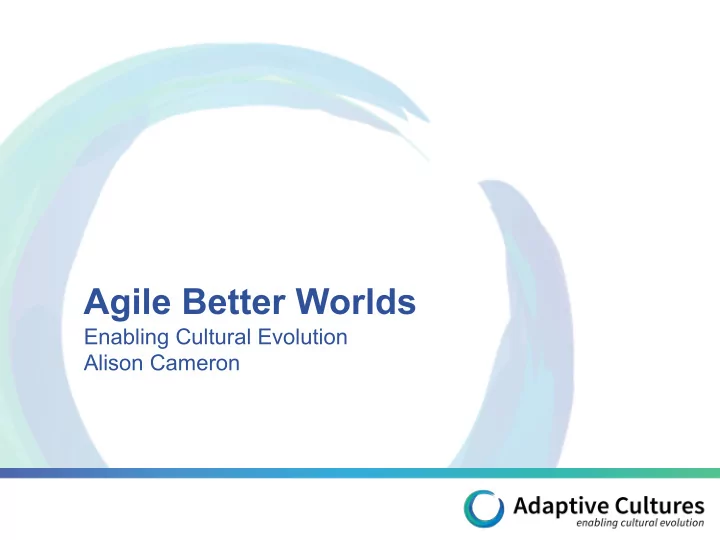

Agile Better Worlds Enabling Cultural Evolution Alison Cameron
Looking for answers to complex challenges
What might it take for humanity to solve some 1% of the really challenging 35% problems we have created? TIME (Kegan, 1994)
Self- transforming mind MENTAL COMPLEXITY 1% 35% 58% TIME (Kegan, 1994)
Evolving Culture 1 The role of human consciousness in enabling collective evolution 2 A framework for cultural evolution 3 The 3 most common mistakes people make when working with culture 4 7 principles for creating more adaptive organisations
“ We cannot solve our problems with the same level of thinking with which we created “ them
Self- transforming mind Self- MENTAL COMPLEXITY 1% authoring mind 35% Socialised mind 58% TIME (Kegan, 1994)
If more organisations perceived their MENTAL COMPLEXITY role to include the deep development and evolution of the consciousness of their people, I wonder what would change? TIME (Kegan, 1994)
Cultural Evolution – Key Ideas 1 Cultures are not static, they are living systems Culture should enable the purpose, essence, 2 strategy and aspirations of the organisation Culture needs to evolve as external markets and 3 internal aspirations evolve Transcend and include - “Don’t throw the baby 4 out with the bathwater”
Agile and Adaptive Cultures - Insights The more adaptive the culture, the more likely the organisation is to successfully adopt a more agile way of working
Agile and Adaptive Cultures - Insights If an organisation is going to be successful in its agile transformation, its whole culture needs to evolve (not just the parts practising “agile”)
Agile and Adaptive Cultures - Insights Adopting an Agile way can help to shape culture, however the lens, focus or world view of the organisation determines how far agile can go towards creating a truly adaptive organisation
Envisioning the Aspirational Culture What is occurring in the What are the organisation’s market? aspirations/strategy and goals? Stability or disruption? How does the How does the What is the organisation need organisation need organisation’s to adapt or stay to adapt or stay purpose? the same? the same?
Diagnosing the Current Culture
Diagnosing the Current Culture What is What are the celebrated and taboos? measured? How would How do people What does you describe respond to leadership look the overall challenges and like? environment? crises?
Capacities built at each Stage Co-creation Collaborative Growth Achievement Compliant Dependent
Cultural Evolution Insights Many organisations are trying to move more than one stage of evolution at a time If we focus on only one axis, we are not able to truly evolve Individual, Social and Structural elements all need to evolve to embed a new stage of cultural evolution
SOCIAL WAYS OF WORKING RELATIONSHIPS ORGANISATIONAL STORIES BELIEFS EVENTS STAKEHOLDERS Levers for Building Adaptive Capacity INDIVIDUAL STRUCTURAL LEADERSHIP MINDSETS ORGANISATIONAL COMPETENCIES INFRASTRUCTURE BEHAVIOURS STRATEGIES DECISIONS STRUCTURES ACTIONS PROCESSES Outcomes: Societal, Industry, Organisational, Collective, Individual
Moments of Transcendence
3 biggest mistakes Not doing the inner work of culture Making it too easy to turn back Not linking to strategy, purpose and performance
7 Principles for creating a more Adaptive Culture Future and external 1 orientation Humane leadership 2 qualities Radical openness, 3 courage and transparency Build adaptive capacity 4 (individually, socially and structurally ) Momentum through 5 ongoing development Shared responsibility 6 for broader systems Respond to higher 7 calling and mission when in crisis
“ Form follows consciousness The quality of results produced by any system depends on the quality of awareness from which people in the system operate. The formula for successful change is not ‘form follows function’, but ‘form follows consciousness’. Otto Scharmer
“ Developing Ourselves The success of an intervention depends on the interiors of the intervener. Bill O’Brien, former CEO of Hanover Insurance
Your Development What is the personal work that I need to do to develop greater courage, compassion and consciousness in service of the communities I work with?
Resources info@adaptivecultures.co | www.adaptivecultures.co
Recommend
More recommend